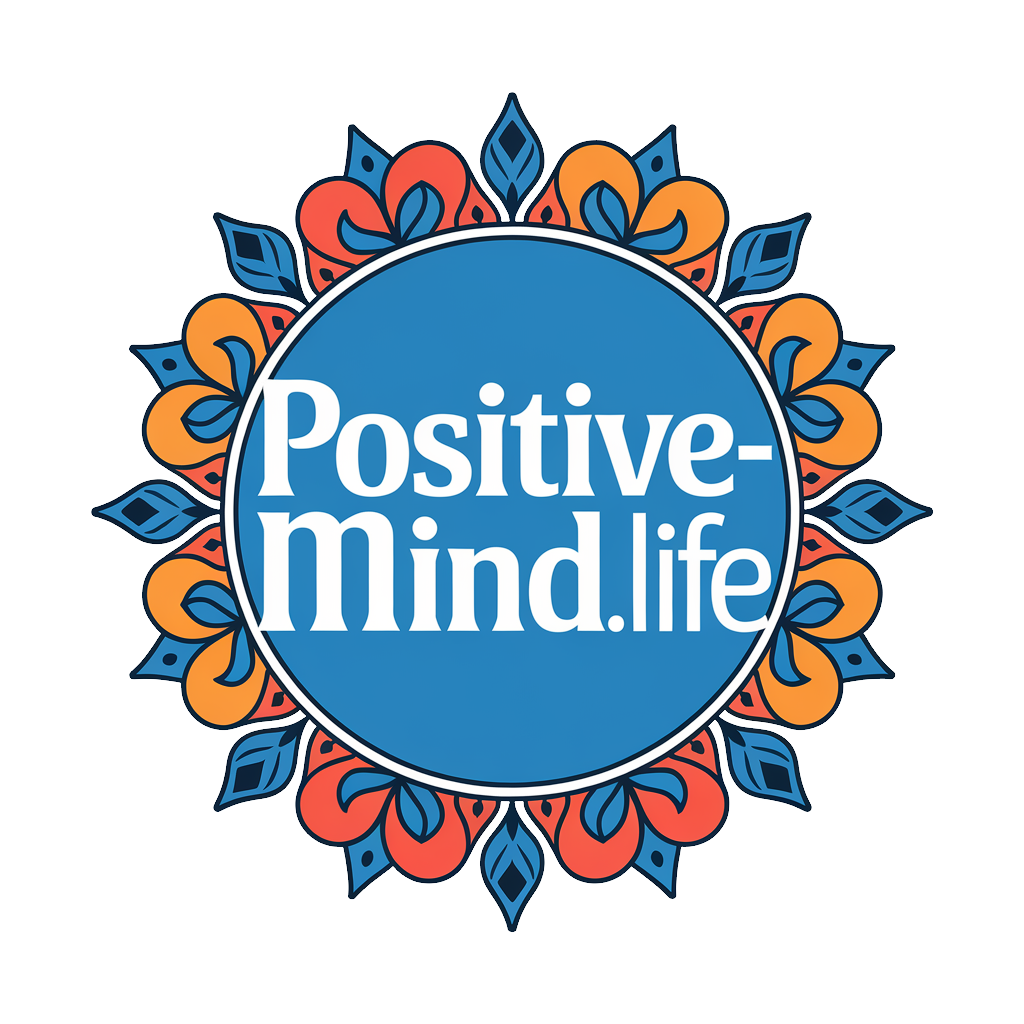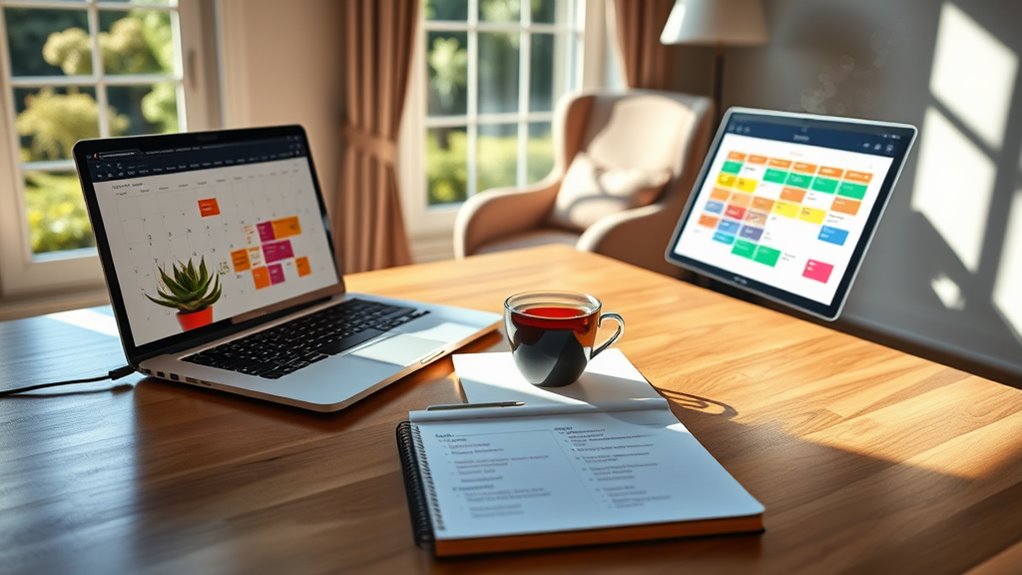Stop Stress Before It Starts With These Simple Tips!
You can stop stress before it starts by adopting a few simple habits. First, identify your stress triggers, like cluttered spaces or overwhelming tasks. Next, practice mindfulness techniques such as deep breathing or meditation to ground yourself. Establish a consistent daily routine that nurtures quality sleep and promotes relaxation. Incorporate physical activity and maintain a balanced diet, as these boost your mood and resilience. Lastly, build supportive connections by engaging with friends or community groups. These strategies can transform your stress levels. Discover even more practical tips to enhance your well-being and maintain a stress-free life!
Key Takeaways
- Identify and manage stress triggers by keeping a journal to recognize patterns and prioritize tasks effectively.
- Practice mindfulness techniques like deep breathing and meditation to promote relaxation and reduce overwhelming feelings.
- Establish healthy routines with consistent sleep hygiene to enhance mood and cognitive function.
- Engage in regular physical activity and maintain a balanced diet to boost resilience against stressors.
- Nurture social connections by participating in community activities and building supportive relationships to reduce feelings of isolation.
Identify Stress Triggers
Often, identifying your stress triggers is the first step toward managing stress effectively. By increasing your stress awareness, you can pinpoint the specific situations, environments, and even people that elevate your stress levels. Start by keeping a stress journal. Whenever you feel stressed, jot down what you were doing, who you were with, and how you felt. Over time, patterns will emerge, revealing your primary stressors.
Consider environmental factors as well. Your physical surroundings can greatly influence your mood and stress levels. Is your workspace cluttered? Do you find noise distracting? Identifying these elements can help you create a more calming environment. Try rearranging your space, adding soothing colors, or incorporating plants to improve your surroundings.
Also, reflect on your daily routines. Are there particular tasks or obligations that consistently stress you out? By recognizing these stressors, you can implement changes or delegate responsibilities to reduce your overall stress. The more you understand what triggers your stress, the more equipped you’ll be to address it proactively. This awareness is key to creating a balanced and fulfilling life, free from unnecessary stress.
Practice Mindfulness Techniques
Practicing mindfulness techniques can significantly reduce your stress levels. Simple breathing exercises help you regain focus and calm your mind, while guided meditation practices can lead you to a deeper state of relaxation. Incorporating these techniques into your daily routine can bring about lasting benefits for your mental well-being.
Breathing Exercises Benefits
Breathing exercises are powerful tools for managing stress and enhancing your overall well-being. When you practice diaphragmatic breathing, you engage your diaphragm fully, allowing for deeper breaths that promote oxygen flow and relaxation. This technique not only calms your mind but also signals your body to switch from a state of tension to one of ease.
Incorporating these exercises into your daily routine can lead to significant stress reduction. Just a few minutes of focused breathing can help you regain control during overwhelming moments. Try this: find a quiet space, sit comfortably, and take a deep breath in through your nose, letting your belly expand. Hold it for a moment, then exhale slowly through your mouth. Repeat this for five to ten cycles, concentrating solely on your breath.
Guided Meditation Practices
Guided meditation practices are an effective way to cultivate mindfulness and reduce stress in your daily life. By engaging in these structured sessions, you can harness the power of focused attention and intentional relaxation. Start with mindful visualization, where you imagine a serene place—perhaps a beach or a forest. Visualize the details: the colors, sounds, and textures. This technique helps ground you in the moment, shifting your focus away from stressors.
Next, try guided imagery. This involves listening to a facilitator’s voice, directing you through calming scenarios. You might be led to explore a peaceful garden or float on a gentle river. Allow yourself to immerse fully in these narratives; they can evoke a sense of tranquility that reduces anxiety.
Incorporate these practices into your daily routine, even if it’s just for ten minutes. Over time, you’ll find that regular engagement in guided meditation enhances your ability to manage stress effectively. Remember, the goal is to cultivate a state of awareness that allows you to respond rather than react to stressors. So, embrace these techniques and experience the profound impact they can have on your overall well-being.
Establish a Routine
Establishing a routine can significantly reduce stress by creating a sense of stability in your daily life. When you set consistent patterns for your day, you’re less likely to feel overwhelmed by uncertainty. Start your day with intentional morning rituals. These could include meditation, journaling, or a brief workout. By dedicating time each morning to activities that center you, you’ll cultivate a positive mindset that carries through your day.
Equally important is your evening wind down. This is your opportunity to transition from the hustle of the day to a more relaxed state. Consider setting aside time for reading, gentle stretching, or deep breathing exercises. Dimming the lights and disconnecting from screens can signal your body that it’s time to rest.
Prioritize Physical Activity
To effectively manage stress, prioritizing physical activity is key. Explore activities you enjoy and set realistic goals to keep you motivated. Remember, even small amounts of daily movement can make a big difference in your overall well-being.
Find Enjoyable Activities
Finding enjoyable activities is crucial for managing stress, and prioritizing physical activity can make a significant difference in your overall well-being. Engaging in physical activities you love not only boosts your mood but also enhances your resilience against stress. Start with hobby exploration—try different activities like dancing, hiking, or cycling. You might discover a hidden passion that allows you to unwind and rejuvenate.
Consider incorporating creative outlets into your routine. Whether it’s painting, gardening, or playing a musical instrument, these activities can serve as powerful stress relievers. They encourage mindfulness, allowing you to focus on the present moment rather than stressors.
Make it a point to schedule these activities into your week. Consistency reinforces the positive effects of physical activity on your mental health. Surround yourself with like-minded individuals who share your interests; social interactions can amplify the joy that comes from these pursuits.
Don’t underestimate the power of fun—finding enjoyment in your activities is key to maintaining balance in life. By prioritizing what you love, you create a robust buffer against stress and foster a more fulfilling, vibrant existence. Start exploring today!
Set Realistic Goals
Setting realistic goals is vital for making physical activity a sustainable part of your life. When you engage in goal setting, focus on establishing achievable milestones that align with your current fitness level and daily schedule. Instead of aiming for an unrealistic target, break your objectives into smaller, manageable steps. For instance, if your goal is to run a 5K, start with a plan that includes walking and gradually increases your running distance.
As you set these milestones, remember to celebrate your progress, no matter how small. Each achievement reinforces your motivation and keeps you engaged. Consider tracking your progress through a journal or an app; this can give you a visual representation of how far you’ve come.
Moreover, be flexible with your goals. Life can be unpredictable, and it’s important to adapt your targets as needed. If you miss a workout, don’t let that derail your entire plan. Instead, reassess and adjust your milestones to maintain momentum.
Incorporate Daily Movement
Incorporating daily movement into your routine can transform your overall well-being and help reduce stress. By prioritizing physical activity, you’re not only boosting your mood but also enhancing your productivity and focus. It’s essential to integrate movement variety and active breaks throughout your day. Here are some practical ways to get started:
- Take short walks during breaks to refresh your mind.
- Try desk exercises to keep your body engaged while working.
- Join a fitness class that excites you; it’s a great way to meet new people.
- Set reminders to stand up and stretch every hour to combat stiffness.
- Incorporate movement into your daily tasks, like doing squats while waiting for your coffee.
Nurture Social Connections
Strong social connections can significantly reduce stress and improve your overall well-being. When you nurture these relationships, you’re not just enhancing your emotional health; you’re also reaping the friendship benefits that come from feeling supported and understood. Take time to connect with friends regularly, whether it’s through a quick text, a phone call, or meeting up for coffee. These small actions can create a strong support network that helps you navigate life’s challenges.
Additionally, consider engaging in community involvement. Volunteering or participating in local events not only broadens your social circle but also fosters a sense of belonging. When you contribute your time and skills to a cause, you’re likely to meet like-minded individuals who share your values. This shared purpose can enhance your connections and further decrease feelings of isolation.
Maintain a Balanced Diet
Nutrition plays a crucial role in managing stress levels and maintaining overall health. By focusing on a balanced diet, you can enhance your resilience against stressors and improve your mental clarity. Prioritizing nutrient balance is essential, as it ensures your body gets the vitamins and minerals necessary for optimal function.
Here are some practical tips for effective meal planning:
- Incorporate whole foods: Choose fruits, vegetables, whole grains, and lean proteins to fuel your body.
- Stay hydrated: Drink plenty of water throughout the day; dehydration can increase stress.
- Limit sugar and caffeine: These can lead to energy spikes and crashes, exacerbating stress.
- Plan meals ahead: Preparing meals in advance helps you avoid unhealthy last-minute choices.
- Listen to your body: Pay attention to how different foods affect your mood and energy levels.
Get Quality Sleep
Although you might underestimate its importance, getting quality sleep is vital for managing stress and maintaining your overall well-being. A good night’s sleep enhances your mood, boosts your cognitive function, and fortifies your immune system. To achieve this, pay attention to your sleep hygiene and optimize your sleep environment.
| Sleep Hygiene Tips | Sleep Environment Enhancements | Benefits |
|---|---|---|
| Stick to a schedule | Darken your room | Improves sleep quality |
| Limit screen time | Maintain a cool temperature | Increases restorative sleep |
| Create a bedtime ritual | Invest in a good mattress | Reduces sleep disturbances |
| Avoid heavy meals | Minimize noise | Enhances relaxation |
Frequently Asked Questions
How Can I Tell if I’m Experiencing Chronic Stress?
Did you know that 77% of people regularly experience physical symptoms caused by stress? If you’re noticing persistent stress symptoms like fatigue or irritability, identify your stress triggers to understand if you’re facing chronic stress.
Are There Specific Foods That Help Reduce Stress?
Yes, certain foods can help reduce stress. Incorporate stress-reducing herbs like ashwagandha and chamomile, and enjoy calming beverages such as herbal teas. These can enhance your mood and promote relaxation effectively throughout your day.
What Are Some Quick Stress Relief Techniques for Busy Days?
When you’re busy, try quick stress relief techniques like breathing exercises to calm your mind. Incorporate mindfulness meditation for just a few minutes; it’ll help you regain focus and enhance your productivity throughout the day.
How Do I Motivate Myself to Exercise When Stressed?
When you’re stressed, remember that exercise motivation can boost your mood. Schedule short workouts, set achievable goals, and reward yourself. This approach not only aids stress management but also transforms exercise into a powerful coping tool.
Can Pets Help Alleviate Stress Levels?
Research shows that pet therapy significantly reduces stress levels. When you engage with animal companionship, your body releases oxytocin, promoting relaxation. So, consider adopting a pet; their unconditional love can transform your emotional well-being.





